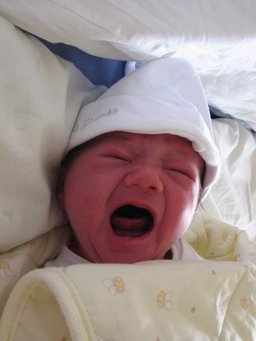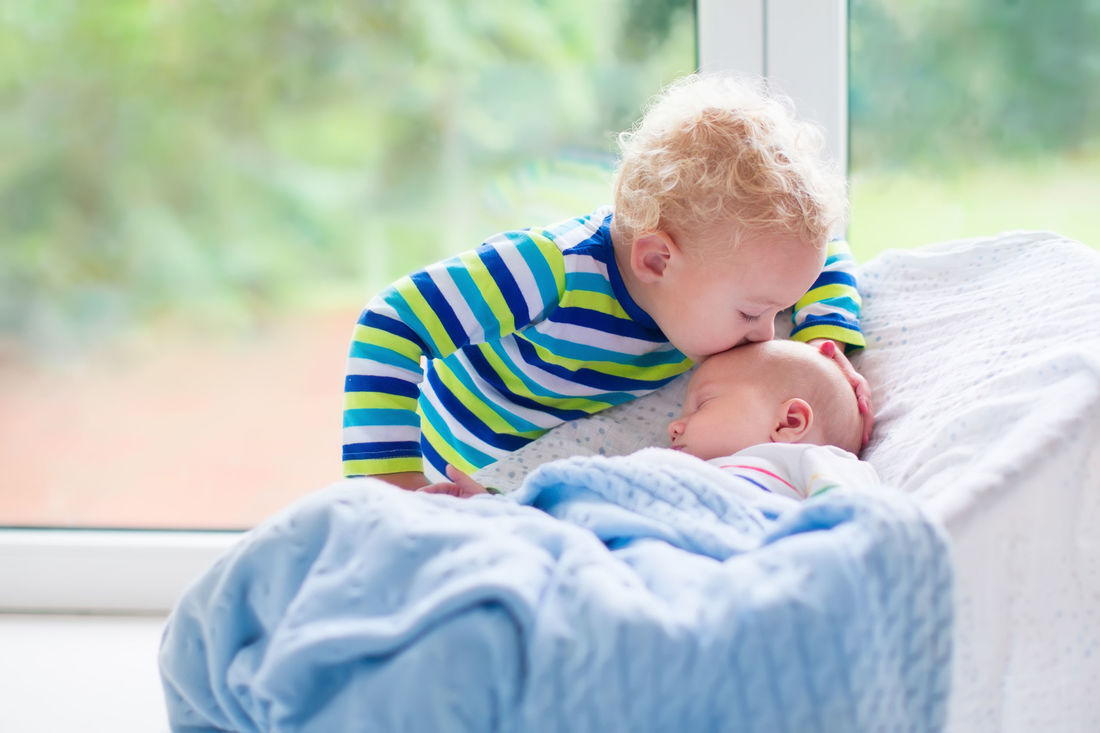|
If you only have 18-20 months or less (eek!!) between babies then jealousy may not be an issue. Children between the ages of two and four can react to the arrival of a new sibling in any number of different ways ranging from being totally disinterested, being extremely loving and gentle straight away, being over exuberant in their affections (or treating the baby like a play thing, trying to pick them up and carry them around whenever you turn your back), being very clingy and wanting to be babied again themselves, liking the baby but being very angry with Mum &/or Dad that things have changed right through to extreme jealousy and outright hatred of the interloper!!
Anecdotally, boys tend to be a little more jealous than girls. Try to remember that it is a phase which will pass. I remember hating my little brother who arrived just after my fourth birthday. I have a very vivid memory of my sister and I staring at his bassinette in the corner of the living room and just wanting to do away with him! It didn’t last long though, we were a very happy threesome. Here are a few ideas on helping your toddler/pre schooler adjust to his or her new sibling:
Today I’m going to use weighing up the pros and cons of babies having what are known as ‘transitional objects’ (or we might call them security blankets, blankies, or loveys) as an example of how we can over intellectualise parenting choices.
I believe that parenting is often about reaching a compromise between what we would like to do in an ideal world, and what we can realistically provide in the long term within our emotional, physical and financial constraints. It’s about weighing up what is best for the whole family and taking an overview approach rather than getting bogged down with minutiae. I’m a big believer in the concept of the ‘good-enough’ parent rather than the quest for perfection. Transitional objects are so called because they act as an emotional bridge between the baby/child and the world, which reminds him of his mother, or makes him feel as if he has part of her with him when he is temporarily separated from her. Studies have shown (and I’m sorry I don’t have a reference for you here, I can’t find where I read it) that when exposed to stressful situations children with security blankets have lower saliva cortisol (the stress hormone) levels than those without. Some children select a blankie themselves without encouragement, some children never attach to a blankie, but many will attach if you encourage them to do so. All you need to do is place the blanket in their hand whenever you are breast or bottle feeding them, whenever you are having snuggles or story, whenever they are tired or upset and when they are old enough to do so safely, place it in their sleeping place. Blankies should be small to reduce the risk of overheating should the baby place it over his head (which they seem to like to do, just to worry you!). What worked for us was having two blankies either side of the cot safety pinned under the mattress so that our babies could access a blankie whichever way they rolled and pull it up to their faces but couldn’t pull it right over their heads. The ability to form an attachment to an inanimate object begins somewhere between about 5 and 9 months. Some people believe that children shouldn’t have blankies because it signifies an unmet need in them, that if they are securely attached to their mother and parented responsively then they would have no need to attach to anything but mother. Aletha Solter is a particular proponent of this school of thought. Aletha Solter is a psychologist who has written several influential books on parenting. Her work is very interesting and do I agree with much of what she says, but I believe in taking the best bits from each person’s philosophy and fitting it to your own life. Following any one person’s advice rigidly usually results in confusion and stress. To me, this is a prime example of the over intellectualisation of parenting. Aletha Solter is an academic so it’s her job to study this stuff, but you can literally find online parenting forums where people are passionately arguing about such trivia. It’s wonderful that people put thought into their parenting choices, but it can go too far! There are people starving in the world you know! It’s been my experience that of the babies and toddlers I work with and know in my personal life, the ones who are attachment parented are indeed less likely to develop an attachment to an inanimate object, however they are also the children who tend to cope poorly when separated from their mother under the age of 4 or 5 (after the age of 5 they may well cope better and be more confident). I’m not holding up being able to cope well without Mum as a good thing. I think we push mothers and children into separating far too early these days and over value independence in children. However, if your child has to be away from you, wouldn’t you rather they had something that helped them cope? It’s my personal belief that encouraging an attachment to a blankie is a positive thing, whatever your style of parenting. You might be a hard-core attachment parent, but when you start out on your parenting journey, you have no idea how things might change. Financial, relationship and health status can suddenly change. You can’t possibly guarantee that you are going to be able to be present with your child day and night until they are four or five years old. You may find yourself suddenly divorced and needing to use childcare for work when you thought you would be a stay at home mum. You may end up in hospital with an inconsolable child at home without you. If your child has a blankie that they adore, even if you plan not to be separated from them at all, at least it is there for them if they need it. Also, a current trend I see is families choosing to attachment parent when at home AND have their child in childcare several days per week. This makes the culture shock even greater for the child so a blankie may be especially beneficial for those children. My children still adore their blankies at age 8 & 10 (only at night!) and their blankies have helped them in the transition to preschool/kindy and with stressful events like having an X-ray or a blood test. I do think if I had allowed them to co-sleep with us indefinitely that they may not have wanted a blankie. I feel a bit sad about that, as it is not a natural thing for a small child to sleep separately from his or her parents. However, I had to take an overview of the whole situation and I know that as a light sleeper and with babies who were light sleepers, we all would have got much less sleep if we had had a family bed. This is an example not letting my philosophy get in the way of adapting to my circumstances. I feel that being against babies having blankies is quite over the top. When you approach parenting from such a strong intellectual and philosophical standpoint, sometimes common sense can go out the window.  All babies start to cry more at about 3 weeks old, peaking at 6 weeks and tailing off at about 12 weeks. Colic is not a medical diagnosis; it is just a word that means ‘we don’t know why this healthy baby is crying more than 3 hours a day, more than 3 days a week, for more than 3 weeks’. It may be due to a combination of neurological immaturity, the sensory overload of being introduced to the world and wind issues. We do know that although babies in traditional cultures who are carried all day and have constant access to the breast have shorter bouts of crying, all human babies have a peak in crying activity at 6 weeks old. So it's not you! It's not something you're doing. It can be very upsetting for parents watching their baby cry and feeling like there is nothing they can do to help, but try to keep in mind that the important thing is that you support your baby through their crying and accept that it is not possible for you to stop all crying. I recently read an amazing scientific hypothesis that colic might be due to babies not being able to separate out their breathing and vocalising, as colic occurs at the age where they are transitioning from one type of control of breathing by the nervous system to a different type which will ultimately allow them to speech-breathe when they learn to talk. If you like to read sciencey stuff and won't freak yourself as it also goes into the possible mechanisms by which this may influence risk of SIDS then the full article is available here: http://cosleeping.nd.edu/assets/194726/colic_sids_family_relations_4.pdf Here are some basic colic tips that may help you ride out this difficult period: - |
SUSANNAH BAdelaide Hills Postnatal Support Specialist CATEGORIES
All
|



 RSS Feed
RSS Feed